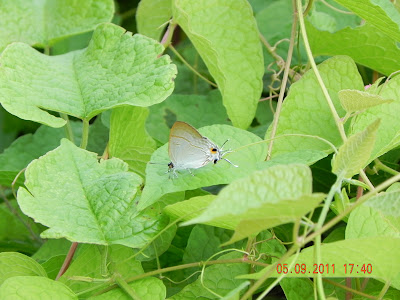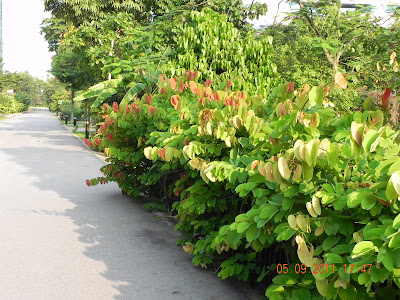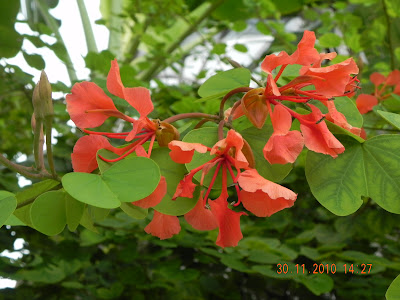I am showing this series of photos to highlight an issue I mentioned before. I commented before that the Bauhinia kockiana (Family: Fabaceae / Leguminosae) should not be planted in troughs like these, which are similar to those on pedestrian overhead bridges and flyovers and so on, with very little soil volume.
In my opinion, it is a mistake to begin with. Just look at the pale green leaves with very obvious interveinal chlorosis. It would look good initially but over time, the fast growing, heavy feeder climber would take up all the nitrogen, iron etc from the soil, resulting in such nutrient deficiency symptoms. It would take lots of fertilizers and regular fertilizing to correct this problem and maintain a healthy looking plant with profuse flowering. Whether it is worth it or not is up to the individual.
By the way, some of the leaf tips are black and this is likely symptomatic of fertilizer burn and / or insufficient water. I know it sounds like a paradox but the fertilizer burn may occur if the quantity of fertilizers, especially inorganic types, used is too excessive and there is inadequate water given to the climber after the fertilizing. For a plant to absorb the ionic nutrients effectively, water is needed to transport them up the plant tissues.
Showing posts with label chlorosis. Show all posts
Showing posts with label chlorosis. Show all posts
11 January 2012
BAUHINIA KOCKIANA
Labels:
bauhinia,
chlorosis,
fabaceae,
fertilizer,
interveinal,
leguminosae,
water
17 September 2011
HORTPARK
The Gardenia gjellerupii was flowering again in the Golden Garden and that set my heart fluttering with excitement.
However, I was mortified by the severe nutrient deficiency displayed by the very beautiful tree. The interveinal chlorosis was apparently quite serious.
Some distance away from this part of the garden, I saw the Common Tit (scientific name: Hypolycaena erylus teatus) butterfly on the leaves of the Antigonon leptopus, where it was wriggling its two tails on its hind wings. Across the other side, I am still in awe by the beautiful coloured leaves of the Bauhinia semibifida var. perkinsae, where the red Russelia flowers took a peek from amongst its leaves.
The Ficus has also started sending down its aerial roots.
However, I was mortified by the severe nutrient deficiency displayed by the very beautiful tree. The interveinal chlorosis was apparently quite serious.
Some distance away from this part of the garden, I saw the Common Tit (scientific name: Hypolycaena erylus teatus) butterfly on the leaves of the Antigonon leptopus, where it was wriggling its two tails on its hind wings. Across the other side, I am still in awe by the beautiful coloured leaves of the Bauhinia semibifida var. perkinsae, where the red Russelia flowers took a peek from amongst its leaves.
The Ficus has also started sending down its aerial roots.
05 December 2010
BAUHINIA GALPINII
 Ever since I first laid eyes on this brilliant climber (synonym: Bauhinia punctata, Perlebia glapinii; common names: Pride of the Cape, Red Orchid Tree, Nasturtium Bauhinia; Family: Fabaceae) at Pioneer's Landscape Nursery, I was totally in awe of this fantastic plant. And when I saw it in Australia, nothing beats the feeling of amazement.
Ever since I first laid eyes on this brilliant climber (synonym: Bauhinia punctata, Perlebia glapinii; common names: Pride of the Cape, Red Orchid Tree, Nasturtium Bauhinia; Family: Fabaceae) at Pioneer's Landscape Nursery, I was totally in awe of this fantastic plant. And when I saw it in Australia, nothing beats the feeling of amazement.So anyway, here are the brick red flowers in two shades although they are from the same plant. One shortcoming is that the plant suffers from nutrient deficiency in Magnesium, as evident by the interveinal chlorosis on its older leaves. I guess nothing is perfect.
Some links on the plant are provided below for reference:
05 September 2010
BAUHINIA KOCKIANA
 I mentioned about the nutrient deficiency symptoms that the common Bauhinia kockiana (common name: Red Trailing Bauhinia) climber commonly suffers from when it is grown in poor soils or soils with a limited volume.
I mentioned about the nutrient deficiency symptoms that the common Bauhinia kockiana (common name: Red Trailing Bauhinia) climber commonly suffers from when it is grown in poor soils or soils with a limited volume.This was what I meant. On an overhead bridge with a small soil volume, the entire trough of Bauhinia quickly exhibited the chlorosis of its leaves, although it did not seem to affect as much of the flowering. However, in the long run, such deficiency would definitely compromise the plant's overall health and growth.






Subscribe to:
Posts (Atom)




































